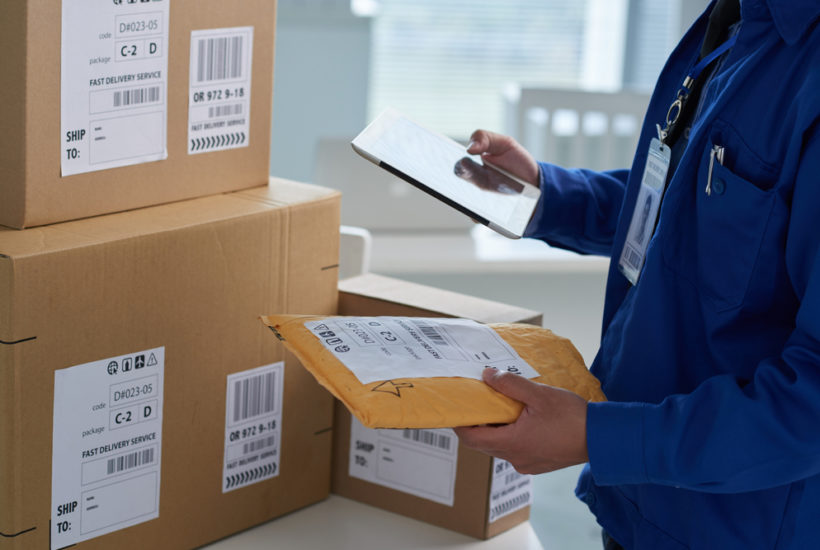Business
Shipping scams businesses and customers should be wary of
During the holidays and year-end celebrations, package shipping increases, and so does theft.

Package theft seems like it’s more of an issue during that time because of how many packages are flying back and forth. The reality is that package theft happens year ’round, and not just to individuals, but businesses, as well.
Beyond the most common forms of theft — packages stolen off a doorstep, for instance — there are well-organized scams. Many of them prey on the human nature of employees or individuals. The best way to prevent them from happening is to understand what they are, how thieves take advantage and when and where they might occur.
1. Fake verification fees
In one common scam, thieves will ask the receiver for a verification fee to release the package. There isn’t a shipment at all. Instead, they are using a skimmer and similar tools to steal personal information and payment details. Sometimes, they may maintain the illusion by providing a fake package, which is generally worthless.
It’s tougher to pull this scam on larger organizations, but when targeting a small business — usually with a single owner or entrepreneur — it works just like going after a homeowner. The thief obtains the payment details and uses them to steal funds or make fraudulent purchases.
2. Phishing emails and account scams
Email phishing is when hackers pose as legitimate companies or contacts to steal sensitive information or gain access remotely. They generally accomplish this by embedding attachments or malicious code inside emails, and when someone interacts with the attachment, it installs a keylogger or monitoring tool on the machine.
One incredibly dangerous and common form of this involves UPS, or at least hackers trying to pose as representatives of the company. Attackers have also used the FedEx name.
Thieves will send fake notifications about an upcoming shipment, ask for shipping fees or some variation thereof. When employees of the company interact with the email content, that’s when the trouble starts. Some hackers even use the method to ship drugs using legitimate business sources.
Other forms of this include stolen or cloned websites, duplicate company names — especially in freight and international shipping markets — forged bills of lading and more.

3. Bogus documentation
Websites, email contacts or local thieves will often reach out to small businesses under the guise that they will offer official documentation. Everything seems on the up-and-up until someone in the company provides money or personal information.
These services promise to deliver official documentation like state business registration papers, federal employer identification numbers, and similar details. Some tricksters will offer sales tax certificates in states that don’t even have sales tax.
The idea is that businesses can get their hands on this documentation much easier, with someone else at the reins. They are almost always a scam of some kind and not worth the trouble.
4. Better business bureau accreditation
There’s a new door-to-door scam going on where representatives claim to be acting for the Better Business Bureau. While posing as employees, they will offer “official” accreditation, which is highly desirable for most small businesses. In some cases, they’ll even entice small business owners to enter a BBB lottery. Essentially, this gives them the idea they’ll have a chance to win BBB support after spending money and providing some personal information.
None of these contacts are actually from the bureau, and the services are, in fact, fake.
5. Fake deliveries or shipping notifications
In some cases, thieves will pretend to be a postal or parcel service and will leave official-looking notifications. They claim you have a package waiting or that you missed a delivery, and provide their contact information. When you call or reach out, they do what they can to steal personal information or even take payment details for fees.
This method overlaps with some of the others mentioned. Presenting official documents, for example, is akin to phishing.
Some fake deliveries involve shipping actual goods. In a Trojan container scam, illegal products arrive inside a legitimate cargo container, with the carrier none the wiser as to what’s happening. They register the container as carrying different items, particularly something a courier would be willing to transport.
6. How to avoid these scams
For starters, never take the word of anyone who walks in off the street. When someone provides a business card or contact information, use it to research their company or organization. More importantly, reference the names and titles of the people you met. If anything doesn’t quite match up, there’s likely something questionable going on.
With digital scams — like phishing websites and emails — always check the contact emails or URLs. They are the most telling signs of what’s going on. The URLs, for example, may mirror legitimate company sites, but they will never be identical. Always go directly to the company’s portal, don’t click on any embedded links and never open attachments.
Finally, avoid taking shortcuts for official processes or certification programs. In the case of the Better Business Bureau scam, realizing there’s no such thing as an open lottery or door-to-door accreditation opportunity can prevent you from getting reeled in.
(Featured image by Dragon Images via Shutterstock)
—
DISCLAIMER: This article expresses my own ideas and opinions. Any information I have shared are from sources that I believe to be reliable and accurate. I did not receive any financial compensation for writing this post, nor do I own any shares in any company I’ve mentioned. I encourage any reader to do their own diligent research first before making any investment decisions.

-

 Biotech6 days ago
Biotech6 days agoInterministerial Commission on Drug Prices Approves New Drugs and Expanded Treatment Funding
-

 Africa2 weeks ago
Africa2 weeks agoMorocco’s Tax Reforms Show Tangible Results
-

 Fintech2 days ago
Fintech2 days agoPomelo Raises $160 Million to Power AI-Driven Digital Payments Across Latin America
-

 Biotech1 week ago
Biotech1 week agoUniversal Nanoparticle Platform Enables Multi-Isotope Cancer Diagnosis and Therapy

























